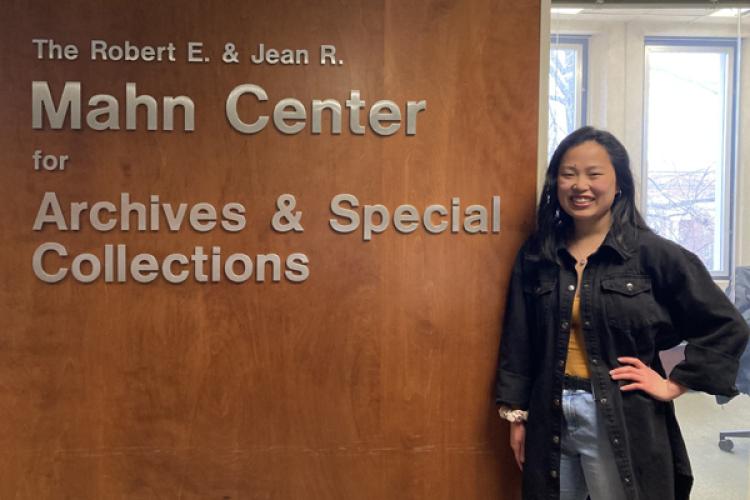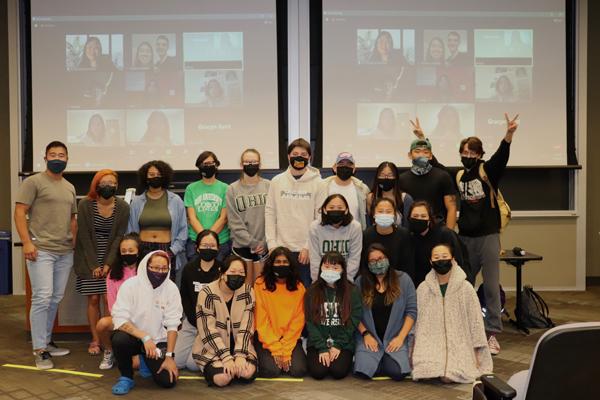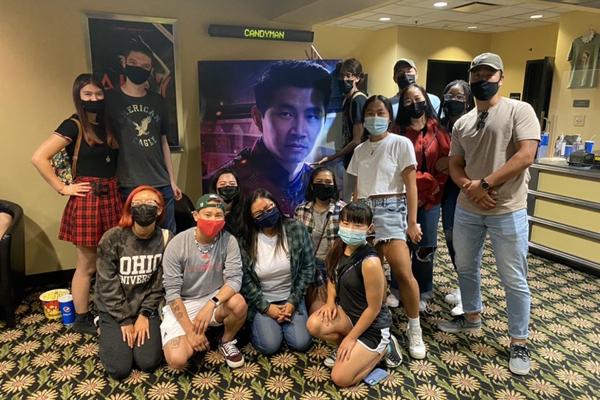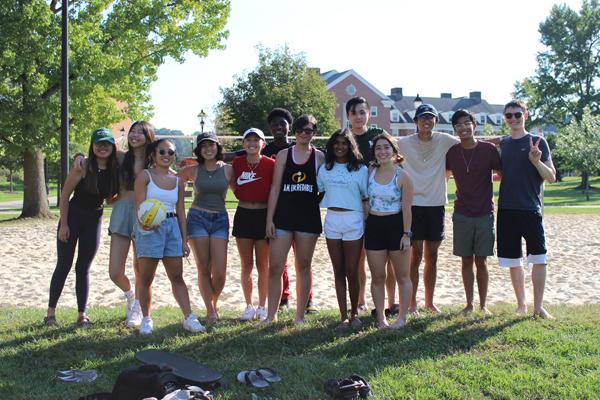
Alexis Karolin is documenting Asian American and Pacific Islanders’ history as it happens

Getting ready for Expo
When historians look back upon societal stress and tumult during the pandemic, they will find plenty of information about the national increase in hate crimes against Asian American and Pacific Islanders and how the Ohio University community came together to create support organizations, safe spaces and visibility for the local community.
Alexis Karolin is carving out a portion of her Honors Tutorial College senior thesis into a project that she'll present at the Student Expo on April 7. An intern at the Robert E. and Jean R. Mahn Center for Archives and Special Collections in Alden Library, she is creating a collection that documents the founding of Asian American and Pacific Islander organizations in Athens during the pandemic.
"In response to the violence, AAPIs across the U.S. launched a #StopAAPIHate in 2021 to speak out against the violence plaguing their community. Likewise in Athens, Asian American and Pacific Islander community members, faculty, staff, and students stood up against the violence and founded respective organizations to support the community. Knowing the importance of their work and the fact that AAPI history remains largely unrecognized in broader U.S. history, I felt it was important to document all the work these groups are doing for future patrons of the library, researchers, or anyone interested in learning about AAPIs in Athens," said Karolin, who is pursuing a history major in the Honors Tutorial College with a certificate in Asian Studies and a certificate in Law, Justice and Culture.
"As an archivist and historian, I am documenting 'history in the making' by collecting founding documents such as, but not limited to, each organization’s mission, meeting minutes, event fliers, and pictures from programming events. The purpose of this project is to increase Asian American and Pacific Islander representation in the archive, especially when this community has long been marginalized or silenced in U.S. history and archival collections," Karolin said.
"My hope is that 50 years from now, if an AAPI student in Athens wants to learn about their local history, they’ll be able to visit their library and have plenty of sources to understand how these organizations started and the work they have done for the community," she said.

The Expo project stems from Karolin's thesis, which contextualizes the increase of reported hate crimes against the AAPI community within the larger framework of Asian American history in the last 150 years since their immigration. Her work examines why Asian American women are more vulnerable to hate crimes, the increase in domestic violence among AAPI immigrant communities, historical relations between the Asian and Black communities, and pan-Asian movements.
Karolin first reached out to the Mahn Center staff in in fall of 2021 with her idea to create an archival collection after working with her thesis advisor Katherine Jellison, Ph.D., professor of history in the College of Arts and Sciences, to create a proposal.
"At the beginning I had many ideas including creating a collection, conducting an oral history project, and creating an exhibit," Karolin said. Soon Greta Suiter, Miriam Intrator, Bill Kimok, and Laura Smith in the Mahn Center became her mentors.
"Each of them has been so supportive throughout the entire process and I am grateful to have such a strong and experienced team," she said. "They welcomed all of my creativity and helped me narrow it down to an achievable project in a semester. This project has never been done before, so oftentimes we come across situations that we aren’t entirely sure how to handle. However, they are always open to brainstorming solutions and pivoting when necessary."

The hardest part: communicating and gaining trust
The hardest parts of her project, Karolin said, have been learning how to communicate the project's importance to a broader audience who may have no background in historical and archival work, gaining trust from the AAPI community, and finding source material.
"As a woman of color, I recognize that white men in power are often the winners in history, so they control the narrative and prioritize their history in the archival collections. Likewise, some members of the organizations expressed fears about donating materials to a university institution, which may misrepresent or tokenize the AAPI community. However, archival centers have begun to recognize the importance of preserving the history of diverse groups. The Mahn Center is committed to paying greater attention to the histories of women groups, communities of color, and LGBT groups," she said.
When working with the local organizations, "it was very important that I stressed my prior research experience on AAPI history and the research work I did early in the internship to understand how to properly represent historically marginalized communities in the archive. I think my research background and my identity as a Chinese American woman helped reassure members of the organizations that I was not going to misrepresent our community and that documenting AAPI history in the archives counters tokenization by increasing visibility of AAPIs in Athens."

Karolin is excited to be taking actionable steps toward increasing representation of the AAPI community in history and overcoming the challenges of finding source material.
"So, when I think about this project long-term, it’s really exciting to know that this archive will serve a larger purpose than just my internship. For example, researchers are currently paying greater attention to the AAPI experience because of the racial violence during the pandemic, so these documents I am collecting might become primary sources in a journal or book. Or 15 years from now, I may return to Ohio University, and they may hold a celebration to commemorate AAPI history. It would be so exciting to see myself and my peers represented in the exhibit."
Karolin's project will be available as a digital archive, which means other AAPIs across the United States will be able to use the documents as a guideline for starting their own organizations on college campuses.
"I believe this project is a great first step to countering the erasure of AAPIs in U.S. history, and I am excited to see how it grows," she said.
What would Karolin tell other students considering presenting an Expo project?
"Say yes to any opportunity to present your research! It is a great time to gain experience in presenting to a wider audience and to receive feedback on how to improve or move forward with your project," she said.
